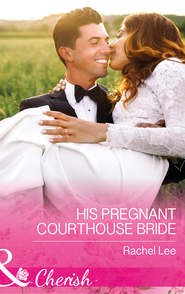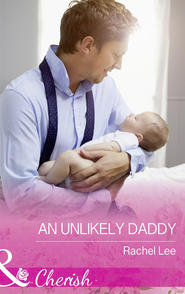По всем вопросам обращайтесь на: info@litportal.ru
(©) 2003-2025.
✖
A Conard County Courtship
Автор
Год написания книги
2019
Настройки чтения
Размер шрифта
Высота строк
Поля
Tim could easily imagine that they were, even though they were almost new. “So how many socks do you have on each foot?”
“Four.”
“What started all this?” he asked, genuinely curious.
“When you were doing the laundry and said I hadn’t worn enough underpants or socks for a week. Fresh ones every day.”
Tim remembered that conversation clearly. Oh, man. “I left out part of the instructions, kiddo. The part about taking off the dirty ones before you put on fresh ones. Come on, let’s get rid of all these in the hamper and put you in the shower.”
Tim wondered if he’d ever learn how literal a child could be. Probably not. He’d keep making these simple mistakes until Matthew grew up enough to fill in the blanks.
With his son showered, dried and in fresh pajamas, Tim scooped him up and carried him to bed. God, it felt so good to have this boy in his arms. He smelled sweet and just so right. Not much more of this, though. One way or another, Matthew was going to get too big, and from what he’d seen of slightly older kids, he’d be lucky to snag a hug.
But for now he took pleasure in the moment and just wished Claire could share it, too.
Sometimes he felt his wife around, as if she peeked in on them, as if her love still existed. Maybe it did. And maybe, like an angel, she kept watch over Matthew. He certainly hoped so.
Though it had been six years since Claire’s unexpected passing, he still missed her. Missed all the little things they had shared, which in retrospect seemed a whole lot more important than the big things.
Glances over breakfast that seemed to warm the air. Shared looks of understanding that needed no words. Being able to reach out and just hold her hand. Those little things had turned into a huge gap in his life.
He wanted no replacement for Claire. He didn’t think it was possible, and he wasn’t looking. Most especially he didn’t want to upset Matthew’s life. His son seemed to have adapted quite well to the fact that he didn’t have a mother, unlike his friends.
Whenever someone pressed Tim on the subject—and yes, he knew they did out of some kind of concern—he simply said that was for later. After Matthew was grown. Safely down the road and something he didn’t need to think about now. Not when he had his son to concern him, and not when he was still aching with loss.
He was learning that you never stopped grieving. It just softened with time. Or became like a comfortable old friend, always there, never gone. At least it didn’t cripple him the way it once had. He could pause, absorb and acknowledge the pain, then keep going.
Matthew made that essential.
Downstairs, he found Vanessa curled up on the couch and sound asleep. He thought about moving her to her room then decided against disturbing her. If she woke up on her own, she could go to her room then. In the meantime, she looked comfortable, and it wouldn’t be the first time that sofa had been a bed.
Out in the kitchen, he opened his laptop and logged in while he brewed fresh coffee. He had more jobs than the Higgins house. There were a couple of remodel and repair jobs he’d promised to email estimates on by Saturday, and he needed to finish them.
He paused a moment, thinking of the woman sleeping in his living room. What a cutie, he decided. A lovely woman, and she’d handled Matthew’s sometimes overwhelming energy well.
Then he returned to work. Two things in his life, mainly. His son and his work. Everything else paled beside them.
Chapter Three (#uf88a1f84-d6a6-5221-83a4-bcc324de7ec0)
Vanessa awoke in the dark. All the lights in the room were off, and in a faint spill of light coming from elsewhere, she needed a couple of seconds to orient herself. Tim Dawson’s house. Conard County. Oh, God.
She sat up, rotating her shoulders and neck to ease the stiffness, and put her slightly crumpled journal to one side. How rude of her. The man had given her shelter, served her a fine meal, and she’d responded by falling asleep on his sofa while he put his son to bed?
Well, maybe he wasn’t terribly offended. She guessed she’d have to wait until morning to find out. She could hear the blizzard now, howling outside as if it were alive. She was so glad she wasn’t alone in that ruin of a house she’d inherited, or at the motel where she’d be stuck in one room alone, probably listening to the more regular patrons celebrate the weather with whiskey.
In fact, though she didn’t drink often, a whiskey didn’t sound too bad to her, either.
She rose, grateful she’d changed into comfy fleece earlier, and stretched every muscle in her body. There was nothing quite like a good stretch. Feeling better, she headed toward the light, which was coming from the kitchen, and was surprised to see Tim at the kitchen table, computer in front of him and stacks of paper surrounding him.
He looked up at once and smiled. “Good nap?”
“I was so out of it,” she admitted. “I’m sorry I fell asleep on you.”
“I don’t remember inviting you here to be entertaining. You obviously needed the sleep.”
“And I really could use some water. My mouth feels so parched. Oh, God,” she added as the thought struck her, “was I snoring?”
“If you were, I didn’t notice. Do you want the chilled bottled water? Or would you rather have something else? I finished the coffee, but I have soft drinks—all the diet variety, I’m afraid—or I could make hot chocolate.”
“Right now just water would be great.” Moving by instinct, she found the glasses in the upper cupboard beside the sink. “You want any?”
“I’m fine.”
She chose to get water from the tap and drained a whole glass before she left the sink, then filled it again halfway and ventured to join him at the table. “Working?”
“Yup. Almost done.”
“Don’t let me disturb you.”
Sipping her water, she closed her eyes, listening to the sounds of the storm outside, and the sounds the house made in response. A gust of wind could cause the slight creaking from somewhere upstairs. If snow was falling, it was mixed with ice that rattled against the window glass. Without even looking she was grateful not to be out in it.
Or, frankly, by herself.
For some reason, being in this town had made her feel isolated. Maybe because she’d left behind the friendly faces of her coworkers and her immediate neighbors in her apartment building.
Maybe because since she’d arrived, she’d met three strangers and knew very little about any of them. Matthew probably couldn’t be included in that, though. There was little doubt as to what he thought about anything.
But Earl, even though she’d talked to him a number of times on the phone, was still a stranger. And for all she was sharing Tim’s house tonight, she knew very little about him except he was a contractor, he had a son and he’d lost his wife.
Just an outline. But what did he know about her? That she worked with dinosaur bones in a museum, that her family had lost everything to Bob Higgins and that she didn’t want this house that had fallen into her lap.
He probably wondered why that was. Not everyone would look at a free house as a problem, even if it did need work.
She had to admit she wasn’t sure herself why she was reacting so strongly. Yeah, the man had cost her family everything and turned them into wanderers. Yes, her father had drunk himself to death, but that had been his choice, not Bob’s. She’d suffered because of what had happened nearly twenty years ago, but this seemed to go beyond bad memories.
Maybe it had bored a hole in her soul, somehow.
With a snap that startled her eyes open, she heard Tim close his computer case. “Done,” he said. “For now, anyway. When the numbers start to look like fish swimming through a tank, it’s usually a good time to stop.”
She liked his ready sense of humor. She envied that it seemed to come so easily to him. She wasn’t a very humorous person herself. In fact, if asked, she’d probably classify herself as...too reserved, she decided finally. Not sour, but reserved.
“So, about your house,” he said. “It’s structurally sound. A couple of roof rafters could use replacing because they got wet at some point, but there’s no dampness up there now. You could probably let those skate.”
She nodded, feeling unready to discuss this, but knowing she couldn’t evade it indefinitely. After all, she’d come back to take care of it, and an inheritance from Bob that she hadn’t turned down was the last of his savings. She figured since he’d dumped his white elephant on her, she needed the money to fix it up and pay the taxes. She just hoped it was enough. Lowly museum assistants didn’t make huge salaries.
“To make the house interesting to a buyer, there are some basic things we need to do. Caulking. The weatherizing in the windows and doors is cracked, unattended for too long. The attic fan is dead. The floors sag and are weak in a few places.” He stopped. “I don’t want to overwhelm you. The question is, do you want to pull it together just enough to hopefully attract someone by marketing it as a major fixer-upper? That’ll cost you a pretty penny in terms of what you can make off it, and frankly, with the amount of cosmetics it needs, that might not even work. You saw the paint sagging on the wall. I don’t like that.”
“It’s ugly,” she agreed.











